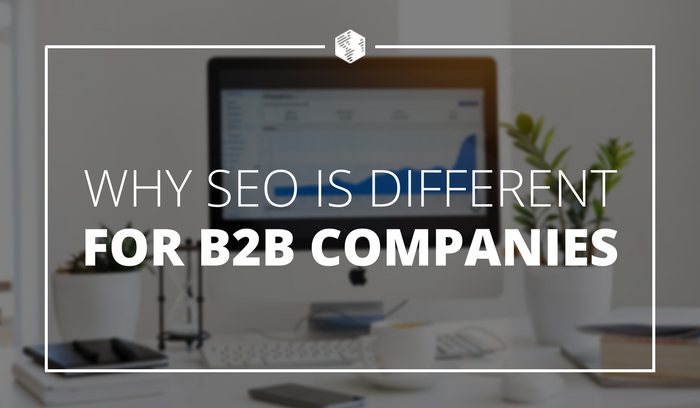Table Of Contents
Search Engine Optimization (SEO) is one of the most important techniques for marketing your business online. Regardless of your industry, or the products or services you’re selling, your customers are likely to turn to search engines for questions, concerns, and advice. However, SEO for a B2B business can look much different than it does for a B2C company.
The business-to-business customer is not the same as the business-to-consumer customer. In the B2B world, buyers are shopping on behalf of their companies rather than themselves, meaning that their needs and problems are more complicated to understand. When the entire company is depending on the right purchasing decisions being made, there is little room for errors, mistakes, or wasted purchases.
In order to optimize your content to address those situations, you need to understand how your B2B buyer is using search engines. Let’s take a look at a few of the major SEO differences for B2B companies—and how you can improve your SEO strategy!
Key Takeaways:
- B2B shoppers are more aware of the industry they’re shopping in, meaning their keywords are usually more specific.
- Multiple types of employees may be searching for solutions to the same problem.
- B2B SEO needs to foster long-term relationships with users, rather than focusing on a quick sale.
The Importance of Search Engine Optimization in the B2B World
In the B2B world, the relationship a salesperson builds with their potential customer is one of the most important factors in closing a sale. However, the relationship isn’t the starting point for a deal to begin. Before a potential customer even thinks to engage with a salesperson, they’re probably going to do their own online research.
Over 77% of all B2B decision-makers will conduct research of their own before ever reaching out to a salesperson. Additionally, 60% of all B2B decision-makers will turn to search in order to complete their research. This means that if you’re not appearing within those relevant search results, you’re missing out on establishing a connection with potential buyers.
Properly optimizing your content to appear within a search engine is just as important for a B2B business as it is for a B2C company. However, SEO works a bit differently for the business-to-business brand.
2 Reasons Why SEO Is Different for B2B Companies
Let’s take a deeper look at two reasons why you need to approach SEO differently when you’re a B2B company.
1. B2B Keywords Are More Specific
When a B2B customer jumps on a search engine to look up a product or a solution to a problem, they’re more likely to have a clear idea of what they’re looking for than a B2C customer. Since the B2B customer usually has a better understanding of the industry, their options, and the solutions available to them, they’ll use more specific keywords or phrases when searching.
To conduct keyword research for your B2B business, therefore, you’ll want to target industry-specific words or phrases. These terms should reflect the business perspective of the searcher, referencing solutions that relate to the problems or issues the company is trying to solve. They can include industry jargon, or phrases only customers with a lot of experience related to the solution would understand.
You can begin keyword research for your B2B business the same way you would for a B2C business, such as by using the Moz Keyword Explorer:

When compiling your list of potential keywords and phrases to use, don’t be afraid to look for some niche words that may dramatically narrow down your audience. The goal is to target the exact group of people you want to convert, and predict their most common questions.
2. B2B Searches May Have Multiple Users
When a B2C customer is searching for a product or service, they’re typically shopping for themselves or their families. This means you usually have just one buyer looking for a solution to a specific problem. However, in the B2B world, individuals within a company may be looking to solve a problem from a variety of different starting points.
Each employee will have a different perspective on what the problem is. For example, a marketing manager and CFO may both recognize that their company could be more efficient, but they will likely attack the problem from different angles. In order to attract the attention of both, your SEO strategy needs to take into account the different ways they may be searching online.
When creating your SEO strategy, you need to consider what decision-makers or influencers you may come into contact with during the research process. Determine who would use your product or service within a company, what their roles are, and what problems you may be able to solve for them. You will then want to create various forms of content that can help those specific individuals through their independent buyers’ journeys.
Bonus: B2B SEO Fosters Long-Term Relationships
In the B2C world, marketers are hoping their content is strong enough to land a sale after their first connection with a lead or potential customer. Unfortunately, this is rarely the case with a B2B business. Due to the number of decision-makers involved and the price tag typically associated with a B2B purchase, companies need to build a long-term relationship with customers before they buy.
A B2B company’s SEO strategy needs to consider these more substantial relationships. By providing content that improves trust, builds authority, and provides help to shoppers while they’re doing research, B2B companies are able to establish a stronger connection with their target audience. However, the keywords you target and the content you create needs to consider the various stages the shopper will go through before they’re ready to buy. This example of a webinar from Hubspot and WordStream is a strong piece of content that can establish a trusting relationship with the target audience:

When creating your SEO strategy and content to support it, you want to consider what information your target audience may need to make a purchasing decision. Since they are unlikely to make an uninformed choice, this means you want to think through every step of the buyer’s journey and consider what information they will require to move forward. Additionally, you want to supply them with content that can help the B2B buyer move out of their research phase, so they will be encouraged to contact a salesperson.
Conclusion
Properly optimizing websites for search engines is important for businesses in all industries. However, those in the B2B world need to consider how their customers may be searching the web differently. When you properly optimize your content to consider the unique needs of the B2B buyer, it will be easier to attract attention through a search engine.
Let’s recap the three reasons why SEO is different for a B2B business:
- B2B searchers use more industry-specific keywords.
- Multiple individuals within a company may be searching for a solution to the same problem.
- SEO needs to foster long-term relationships with B2B shoppers.
How do you think these perspectives will changes your SEO strategy? Let us know in the comments section below!
Image credit: Pixnio.







